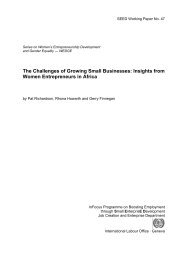manual: women workers' rights and gender equality - International ...
manual: women workers' rights and gender equality - International ...
manual: women workers' rights and gender equality - International ...
You also want an ePaper? Increase the reach of your titles
YUMPU automatically turns print PDFs into web optimized ePapers that Google loves.
Your role is to be a facilitator. This means that you do not lecture or dominate the training<br />
sessions. Allow the participants to do most of the talking <strong>and</strong> activities. Your role is to encourage<br />
everybody in the group to actively participate in all sessions <strong>and</strong> to create a positive environment<br />
for interaction <strong>and</strong> dialogue among the participants. The materials in the training package will help<br />
you to provide information <strong>and</strong> to stimulate thinking <strong>and</strong> discussion among the participants.<br />
As a trainer <strong>and</strong> facilitator, it is very important that you:<br />
• Give a brief introduction at the start of each workshop <strong>and</strong> training session on the aims <strong>and</strong><br />
outputs. Give enough background information, but be clear <strong>and</strong> brief.<br />
• Provide a summary of main findings, conclusions <strong>and</strong> suggestions for future work at the end of<br />
each session or before the start of the next one.<br />
You do not need to be an expert on everything. An important role of a facilitator is to ‘sign post’, in<br />
other words to channel participants to sources where they can obtain the information that they<br />
seek. If you feel that you do not know enough about a subject, for example, domestic violence or<br />
occupational health <strong>and</strong> safety risks in specific industries, invite an expert on the subject. Try to<br />
ensure that such experts do not lecture, but share information in a participatory way.<br />
The training package contains a collection of games, exercises, case studies, stories <strong>and</strong> role<br />
plays. These training materials have been selected after an in-depth review of existing materials on<br />
this subject in Cambodia <strong>and</strong> at the international level according to their relevance in putting main<br />
messages across. They have been used <strong>and</strong> field-tested with positive results in your <strong>and</strong> other<br />
countries. However, it is important that you make your own selection of materials, that you adapt<br />
the training sessions, the exercises <strong>and</strong> case studies <strong>and</strong> provide additional materials relevant to<br />
each group, the local culture <strong>and</strong> situation. The materials can be shortened, simplified or replaced<br />
by other materials, as you see fit.<br />
2.6 Designing a training programme<br />
In order to be successful in your training it is very important to spend time at the design stage. With<br />
a well-prepared training programme half the work is already done.<br />
Basic Questions<br />
Designing a training begins with basic questions like:<br />
1. What is the aim of the training?<br />
2. Who are the target group: will there be a mixed group, or men- or <strong>women</strong>-only groups.<br />
3. What is their ethnicity: Are there socio-economic, cultural <strong>and</strong>/or religious differences among<br />
participants or between participants <strong>and</strong> trainers? Try to ensure that one or more of the<br />
trainers or facilitators belong to the same ethnic group as participants.<br />
4. What is their educational level: this affects the level of information you provide to the group.<br />
5. Communication: what language do the participants speak, do you need an additional (local)<br />
facilitator or translator.<br />
6. Where do I organize the training: in the village, at the workplace or at a school.<br />
7. At what time: keep in mind the agricultural seasons, for some people it is difficult to find free<br />
time during the agricultural planting or harvesting season. If you do something with children you<br />
should schedule it after school. With <strong>women</strong> you have to keep in mind their workload <strong>and</strong> find<br />
out when they can attend. Assembly-line factory workers may be too tired on workdays, so<br />
sessions may only be possible on weekends.<br />
12

















